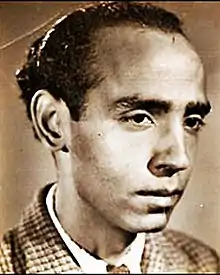Rajendra Krishan
Rajinder Krishan Duggal (6 June 1919 – 23 September 1987) also credited as Rajendra Krishan, was an Indian poet, lyricist and screenwriter.[2][3] His poems and lyrics were in the Urdu language.
Rajinder Krishan | |
|---|---|
 | |
| Born | 6 June 1919 |
| Died | 23 September 1987 (aged 68) [1] |
| Other names | Rajinder Krishan |
| Occupation(s) | Film Songs Lyricist, Dialogue and Screenplay Writer |
| Years active | 1948 – 1987 |
| Awards | Filmfare Awards in 1966 |
Biography
Rajinder Krishan was born in a Duggal family at Jalalpur Jattan on 6 June 1919, in Gujrat District (in present-day Pakistan).[4] Even when he was studying in the eighth class he was attracted towards poetry. In his early work life he had a clerk's job in the municipal office in Simla, where he toiled up to 1942. During that period, he read eastern and western authors extensively and wrote poetry. He expresses his indebtedness to the Urdu poetry of Firaq Gorakhpuri and Ahsan Danish, as well as to the Hindi poems of Pant and Nirala. In those days the newspapers in the Delhi-Punjab brought out special supplements and held poetry contests to mark Krishna Janmashtami, in which he participated regularly.
In the mid-1940s, Krishan shifted to Bombay (now Mumbai) to become a screenwriter in the Hindi film industry. His first screenplay was Janta (1947). His first film as a lyricist was Zanjeer (1947). He was first noted for the script and lyrics of the Motilal-Suraiya starrer Aaj Ki Rat (1948). After the assassination of Mahatma Gandhi, Krishan wrote a song Suno Suno Aye Duniyawalon, Bapu Ki Yeh Amar Kahani. The song was sung by Mohammed Rafi and composed by Husnlal Bhagatram, and was a great hit. He also tasted success as a lyricist with the films Badi Bahen (1949) and Lahore (1949).[2]
Rajinder Krishan is known for his association with the composer C. Ramchandra. He worked with several other music directors including Shankar–Jaikishan, Ravi, Rajesh Roshan, Madan Mohan, Hemant Kumar, Sajjad Hussain, Sachin Dev Burman, Rahul Dev Burman, S. Mohinder, Chitragupta, Salil Chowdhury, and Laxmikant–Pyarelal.[3][2]
Death and legacy
He died on 23 September 1987 in Mumbai.[1] After his death, HMV brought out an LP containing 12 of his songs. He was known to keep a low profile and did not actively seek much publicity about himself. That's why many people that liked his penned songs, didn't know what he looked like due to a small number of available professional pictures of him.[1][2][5]
Trivia
Rajinder Krishan was considered the richest writer in Hindi cinema. The reason was that he had won a jackpot worth 4,600,000 rupees in horse racing. The sum was considered a huge amount during the late seventies.[2]
Awards
Rajinder Krishan won Filmfare Award for best lyricist for the movie Khandan (1965) for the song "Tumhi mere mandir, tumhi meri pooja".[5]
Filmography
|
|
Hindi film songs
|
|
References
- Rajiv Vijayakar (6 October 2013). "Rajendra Krishan: The Low-Profile Giant". Bollywood hungama website. Archived from the original on 22 May 2015. Retrieved 10 January 2021.
- Narendra Kusnur (5 June 2019). "Rajendra Krishan, the lyricist who mastered all genres". The Hindu (newspaper). Retrieved 11 January 2021.
- Suanshu Khurana (13 September 2015). "That Song in Your Head: Shankar Mahadevan, Amitabh Bhattacharya and others share their favourite songs over the years". The Indian Express (newspaper). Retrieved 10 January 2021.
- Adrian Gaster, ed. (1977). International Who's who in Music and Musicians' Directory. Melrose Press. p. 470. ISBN 9780900332449.
- Param Arunachalam (19 September 2015). "Bollywood Retrospect: The best of lyricist Rajendra Krishan". DNA India website. Retrieved 11 January 2021.
- Most Popular Songs By Rajendra Krishan As Lyricist MySwar.com website, Retrieved 11 January 2021